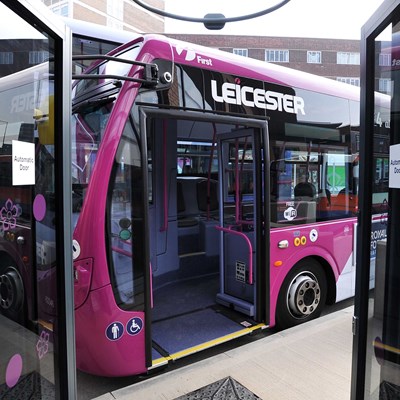PLANS to enhance local bus services through an enhanced partnership with local operators have been announced by Leicester City Council.
The city council has signalled its plans to develop a new Bus Service Improvement Plan (BSIP) for Leicester, working closely with local operators to further improve public transport and help unlock major Government funding.
The move is in response to the government’s new National Bus Strategy (Bus Back Better), which requires local authorities to work with operators to come up with ambitious plans to encourage more people to use local bus services.
National funding of £3 billion has been pledged by the government to help deliver the necessary improvements.
Leicester’s new Bus Service Improvement Plan will help ensure that it secures a fair share of that funding.
The city council will have four months to develop and agree a new BSIP with local bus operators. This will include a public consultation due to launch later this summer.
Deputy City Mayor Cllr Adam Clarke, who leads on environment and transportation, said: “By working closely with local bus operators we have, in recent years, been able to bring about improvements such as greater bus priority, real time bus information, contactless ticketing, the city centre clean air zone for buses and continued improvement in emissions – all despite the city council’s limited powers of influence.
“Now we want to take this new opportunity to work even more closely with bus companies on issues around bus fares, more investment in electrifying the city’s bus fleet and further improvements across the network.
“This will build on the huge investment in improving services for bus passengers in the city with a new fleet of electric buses on park and ride services, new bus priority schemes and work underway on our carbon neutral replacement for St Margaret’s bus station.
“A high quality and attractive public transport network will be vital for the city to meet its environmental, economic and growth challenges in the years to come. It is, therefore, encouraging that the government recognises the important role that councils can play in improving bus services, thirty-five years on from bus deregulation.
“New investment and making sure that we’re listening to people about the improvements that they want to see will be critical to encouraging more passengers back onto public transport, particularly after what has been a very challenging year for the bus industry and its workforce, who have kept people moving safely.”
The city council’s formal notification of its intention to develop and adopt a Bus Service Improvement Plan will begin a process of consultation with bus operators and local stakeholders to establish agreement on what each party will contribute to a new and enhanced partnership.
Under the new National Bus Strategy, councils that do not move towards an enhance partnership with local bus operators will be given the option to explore a franchising route. If given approval from the Secretary of State for Transport, this option would allow local authorities to set a specification for bus services which companies would then be invited to tender for.
Leicester City Council is already carrying out an ambitious £80million citywide programme of investment in sustainable transport, backed by £40million from the Department for Transport’s Transforming Cities Fund (TCF). The package of work will focus on major sustainable transport improvements to provide attractive choices for people to get to work, education, local and other facilities supporting the city’s growth and deliver on the council’s climate emergency, air quality and healthy living commitments.
Schemes include the introduction of electric buses onto local Park and Ride services, major investment in bus lanes to help improve bus journey times and improvements to real-time information to support the reliability of services.
The city council has also begun a new 10-year contract with leading out-of-home advertising and infrastructure company Clear Channel UK to replace and manage the city’s 479 bus shelters. As part of this new contract, Clear Channel are making a multi-million-pound investment into overhauling every bus shelter in Leicester with eco-friendly alternatives, at no cost to the city council. This includes the largest network of living roof bee-friendly bus shelters in the UK.
Work is already underway on a new carbon neutral bus station building at St Margaret’s. The £13.5milllion bus station redevelopment is part of the St Margaret’s Gateway regeneration project. This is supported by a £10.5million allocation from the Getting Building Fund, a pot of government funding awarded to the Leicester and Leicestershire Enterprise Partnership (LLEP) for shovel-ready infrastructure projects to create jobs and support economic recovery across the country.
And a new London Underground- style ‘Tap on Tap Off’ payment system has also been introduced on First Leicester buses in partnership with the city council. This will make travel easier for passengers and automatically ensure that they are paying the lowest fare for their journey. The city council will be working with local bus operators to roll this out to all service over the coming months.
Nigel Eggleton, Managing Director at First Leicester said: “The recent introduction of Tap on Tap off technology providing customers with the peace of mind that they are always getting the best value fare for their bus journey is a great example of how by working together with Leicester City Council we can introduce and improve bus provision in the city.
“There are several initiatives in the pipeline that with the help from the £3 billon pledge from government can make a real difference to the quality, reliability, and attractiveness of bus services in Leicester.
“As we enter a period of recovery, we recognise there is a significant challenge ahead for us all, but I firmly believe that by working together we can build a stronger, greener, and fairer Leicester bus network that the city can be proud of”
To find out more about the new Bus Service Improvement Plan visit www.leicester.gov.uk/buspartnership
